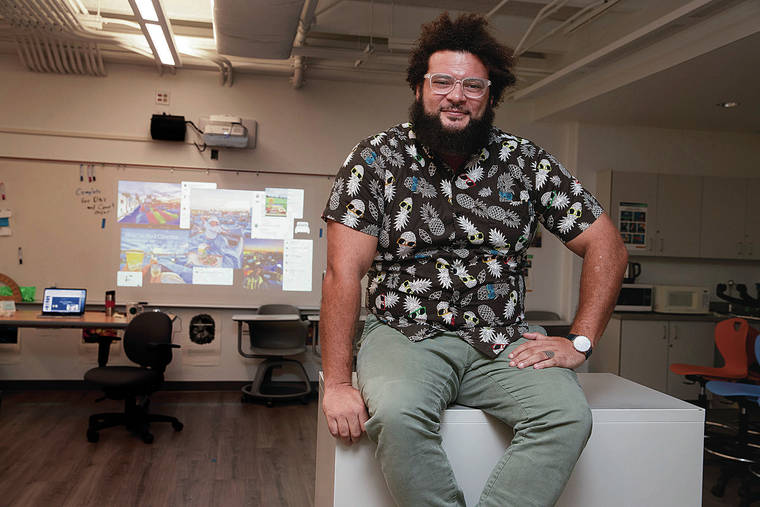Campbell teacher gets $25,000 grant to create Ewa Beach drive-in cinema

GEORGE F. LEE / GLEE@STARADVERTISER.COM
Campbell High School math teacher Wesley Adkins plans to have his students create and run a drive-in cinema, harnessing their many skills from computer engineering to culinary arts.
Campbell High School’s Wesley Adkins is no ordinary math teacher, churning out formulas and problem sets. He sees the big picture — and he wants his students to do the same.
A film buff all his life, Adkins just won a $25,000 Education Innovation Teacher Challenge grant for his proposal to have his students create the Ewa Beach Drive-In. The award from Farmers Insurance Hawaii and the Public Schools of Hawaii Foundation will be publicly announced today.
Adkins, 35, sees launching a drive-in cinema as a great way to harness his students’ varied interests and help them develop diverse skills, from engineering the movie screen to curating and creating films, and developing business plans, computer apps, even recipes for the snack bar.
“The possibilities are limitless,” Adkins said. “I’m a firm believer that if you can just find something that you love, you can learn about the rest of the world through that thing that you love.”
And drive-ins are well suited to the coronavirus pandemic.
“This is a perfect way to bring the community together without having to be fearful about distancing restrictions,” he said in an interview.
Don't miss out on what's happening!
Stay in touch with breaking news, as it happens, conveniently in your email inbox. It's FREE!
Adkins hopes students will learn about the history of cinema and its impact on society, and start thinking about what they can provide for their community and its future.
“Drive-in theaters are definitely a blast from the past,” he said. “I think it’s important to remember, by exploring and understanding the past, you can really shape the future.”
A Teach for America corps member, Adkins is in only his second year as a math teacher. He has a master’s in education and has worked with nonprofits and taught English abroad.
“You wouldn’t know that he is a math teacher because he integrates so many things,” Principal Jon Henry Lee said. “And that’s what’s going to make the learning that much more powerful for the student. It comes from these integrated projects where you connect the dots.”
“He captures their imagination first,” Lee said in an interview. “A lot of students, the second you talk about geometry or math and things like that, sometimes it turns them off, right? But if you talk about a project that incorporates all the things they care about, whether its the marketing, pulling together the engineering, creating stories … that’s what clicks with students.”
Adkins hails from California and his wife is from Japan, so Hawaii is a perfect midway point for their growing family. His first year at Campbell was disrupted by the pandemic, and his students are still online, though some may soon be back on campus.
“I’m more than confident that we can pull this off in the midst of this pandemic because I think my students are hungry for something like this,” Adkins said. “I never thought I’d hear kids tell me that they wished they were in school, they miss being in school, but we hear that constantly now. We see this as a great opportunity to bring kids together and make them feel as if they have some normalcy restored to their lives.”
The criteria for the grants are threefold: innovation, community impact and execution, including long-term sustainability.
“We were just blown away by your project,” Ken Hiraki, president of the Public Schools of Hawaii Foundation, told Adkins on Monday. “It’s very creative, it provides some entrepreneurship and you can scale it with other schools.”
Farmers Insurance and the foundation also awarded a $25,000 Education Innovation grant to Tyler Gage at Chiefess Kamakahelei Middle School on Kauai which was revealed Friday.
His proposal, Pueo Business Leaders of Tomorrow, involves entrepreneurship as well. His students will grow produce in the school’s hydroponic greenhouse, prepare food products for sale at farmers markets and donate the proceeds to local nonprofits.
“The idea behind it is the concept of growing food and learning how plants grow through a hydroponic process, and then taking those food items and repurposing them into a product to sell to the local community,” Gage told his colleagues Friday at a virtual meeting.
“It’s going to be an exciting adventure given the restraints that we have,” he added. “But the kids are already on their way, and they’re developing some really awesome ideas so far. I’m really looking forward to seeing what they come up with.”






